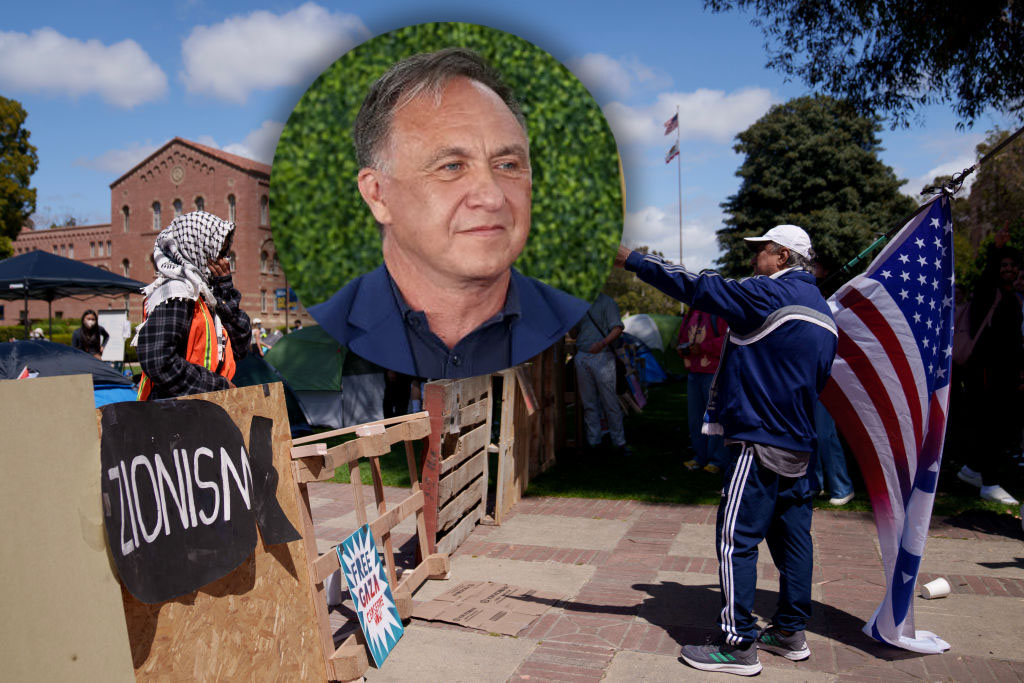One of Denmark’s most successful film directors, Susanne Bier, is starting to make a name for herself here in the United States. Given that her latest film, “After the Wedding,” was one of the five nominees for this year’s Best Foreign Language Film Oscar, it might be more accurate to say that she has made a full-fledged splash.
“Wedding” is Bier’s ninth film, although only her last three — “Open Hearts,” “Brothers” and “After the Wedding” — have been released in the United States.
The theme of all three films is a subject that has fascinated the Danish Jewish filmmaker, the daughter of Holocaust survivors: The fragility of life or, as Bier puts it, “What happens when fate snaps its fingers and turns life upside down.”
In “Open Hearts” a man is paralyzed in a car accident; in “Brothers” a husband and father is lost in war. The repercussions from these sudden, random events echo far beyond their immediate victims.
Tragedy also strikes in the blink of an eye in “After the Wedding.” Jacob, a seemingly selfless Danish humanitarian aid worker, runs an orphanage in India that is running out of funds. Wealthy businessman Jorgen offers to help — on one condition: Jacob must come to Copenhagen and accept the money in person.
Unwilling to return to the site of so many bad memories, Jacob resists. When he finally submits, he walks straight into his past; it turns out that Jorgen’s wife is the girlfriend he left behind 20 years ago.
In a recent Journal interview, Bier described her worldview — as presented in “Wedding” and her other films — as “part of the Jewish conscience; you know catastrophe is a possibility. You are brought up with an extreme awareness of the unexpected.” There is also a recognition that life goes on and that, no matter how difficult it might be, one must adapt and move forward.”
Bier was raised in Copenhagen in what she describes as “a very happy Jewish Danish family,” but her parents’ childhoods were less stable. Her father’s family fled Germany for Denmark in 1933 (her mother was born in Denmark); both of her parents were children in 1943 when the Danish government
was warned that the Nazis were going to start picking up Danish Jews.
“The government warned the rabbis and most of the Jews managed to escape to Sweden, which was not occupied by German troops,” she said. “My parents were among the evacuees” although they didn’t meet until many years later.
Other countries (and individuals) had more complicated reasons for saving Jews: “Wedding” also explores the complexities of altruism.
“We want to do something good, but what are our motives really like,” Bier told Cineuropa of the fictional Jacob. “Is it because we don’t want to deal with something in our lives or just a pure desire to help someone else? It’s probably a mix.”
Bier told The Journal that because of what her parents “went through, they were very keen on giving my brothers and me very secure, happy, uncomplicated childhoods.”
“I always felt extremely loved,” continued the filmmaker, a petite brunette with a vivacious but relaxed manner. “I think that is the most important thing for a child, in that it enables you to have a strength to do what is right for you to do.”
Judaism has played an important role in her life and attitudes. Despite the relative lack of anti-Semitism in Denmark, she has always had a sense of somehow being different. Asked if she feels Danish, she reflects a moment, then says, “I like living in Denmark. I appreciate that we have social security, old-age homes, a sense of society as being there to take care of the weakest.
“But do I feel Danish? I feel comfortable many places, but I’m not sure I feel at home anywhere.
“In Judaism, roots are to a culture, a history, rather than to a place,” she continued. “It may be different here in America, where the Jewish community is so large and it has been here for such a long time. We are a small community in Denmark.”
She attended Jewish schools. Upon graduating, she went to Jerusalem for a year.
“I went to the Bezalet Academy of Arts and Design to study comparative religions but, to tell you the truth, I really just partied for the year,” Bier said. “I fell in love with somebody different every 10 minutes.”
She then went to London to study architecture. While there, she realized that what she really wanted to do was to make movies.
“I became interested in set design and started reading scripts. I realized I was much more interested in who was living inside the buildings than the actual buildings. So I applied to the National Film School in Copenhagen.”
She graduated from Film School in 1987. Her graduation film won first prize at the Munich Film School Festival and was picked up for distribution by Britain’s Channel Four. Her first feature, in 1990, was “Freud Leaving Home.”
Bier is currently in post-production on her first English-language film. It will be released in the fall.
Jean Oppenheimer writes for American Cinematographer magazine, the New York Times Syndicate and the New Times Corp., as well as serving as a film critic on “Film Week” on KPCC-FM. 89.3.
Did you enjoy this article?
You'll love our roundtable.
Editor's Picks



What Ever Happened to the LA Times?

Who Are the Jews On Joe Biden’s Cabinet?


No Labels: The Group Fighting for the Political Center
Latest Articles

A Bisl Torah – Souls Connected




Police Clear Pro-Palestinian Encampment at UCLA










 More news and opinions than at a Shabbat dinner, right in your inbox.
More news and opinions than at a Shabbat dinner, right in your inbox.